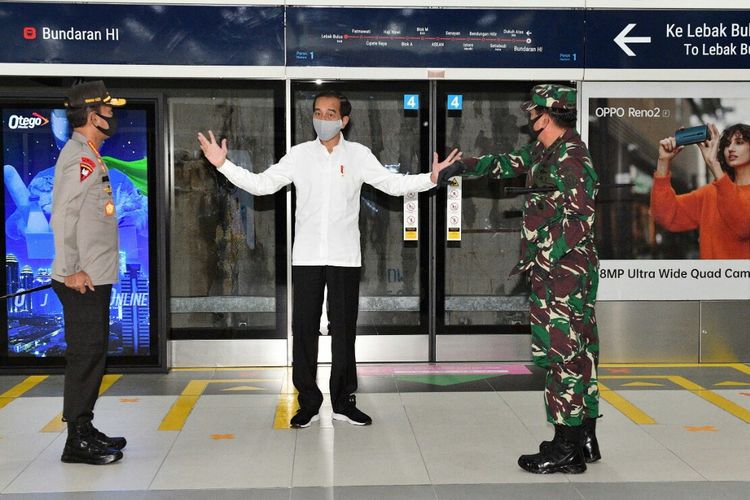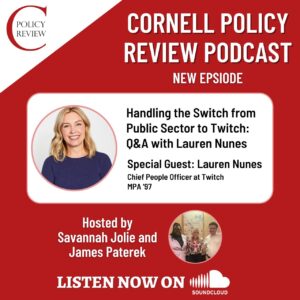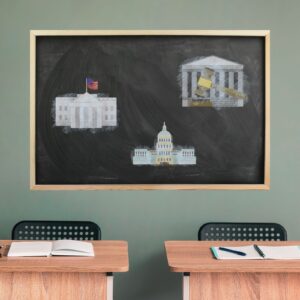
Source: Kompas.com
Written by Thomas Noto Suoneto
The political consequences of COVID-19 have accelerated more security threats to our planet. There are various perspectives to see it as a security threat through different viewpoints. Global security described as freedom from fear of human-made physical violence or direct threats to an individual’s safety, physical integrity and state’s integrity[1]. The COVID-19 pandemic is primarily threatening “individual safety”. The dangerously invisible threat caused by COVID-19 to individual health is inevitable. According to the official data of World Health Organization (WHO), the plague has affected more 106 million people and killed more than 2.3 million in 218 countries worldwide[2]. Governments have imposed lockdown policies to mitigate the COVID threat, enjoining its populations to stay at home. Many are unemployed, socially, and economically unstable, and eventually risking state integrity. Whether the virus is man-made or naturally born, this pandemic has emphasized the relevancy of human security concept as its threat has shifted from nation-states to that of “people” and ”people-centered”[3].
To protect their populations, different governments have their own perspectives, so as their measures in fighting this pandemic. The major determinant distinction is state capacity in handling the virus. As it is logically understood, the security risks would be more concerning to vulnerable states. Nevertheless, the COVID-19 pandemic has shown an unusual fact. It has no boundaries and not particularly exclusive to poor or least developed states. The top 5 affected countries now are the world’s most developed and industrialized economies, namely the United States, India, Brazil, Russia, and France.
COVID-19 as an Object of Securitization
COVID-19 has heavily been securitized. Securitization is a more extreme version of politization and the conception of an issue to have a consequential security dimension is not a natural given[4]. Politicians and decision-makers designate it.
The securitization process of COVID-19 can be assessed from how it’s been framed through speech acts. COVID-19 has been articulated with some alarming dictions. The WHO Secretary-General Tedros used “fear, fight, threat” many times in his first COVID-19 address[5]. The usage of “war” to describe the fight against the pandemic evinced how much this pandemic is seen as an adversary to global security. The phenomenon of COVID-19, which has been labelled as “dangerous”, “threatening,” or “alarming” by world leaders (securitizing actor) provided the path and pushed the social and institutional power to move this issue beyond health, politics, and economy.
As what Barry Buzan, a famous scholar who conceptualized the theory of securitization, the successful speech act can be reflected from the political acceptance of the audience. The “What Worries the World” poll by IPSOS Mori[6] found that “coronavirus” is placed at the top global concern accounts for 47 percent of all respondents, throwing down the “crime & violence” issue at the 5th position. However, in quantifying the acceptance of COVID-19 as a “major threat”, the Pew Research Centre found that most Europeans still view climate change is the most threatening issue than the infectious disease[7]. Only people in South Korea, Japan, Australia and the United States regarded COVID-19 as the preeminent threat. These data are in line with a theory that different audience provides distinct support in one and the same process of securitization[8].
The current situation shows three different trends of political acceptance of audience towards COVID-19 as a security threat : (1) major part of population who have constructed the virus as the most threatening problem to their individual and nation’s security (mostly countries with the highest cases), (2) small group of population who disbelieve the virus threat at the first place and impelled by conspiracy theories and anti-science paradigms, (3) audience who lives in the countries with less impact of COVID-19 pandemic or have managed the infection effectively (New Zealand, Vietnam, Taiwan), so the construction of COVID-19 as the most frightening issue is no longer viable.
Leaders of the world have framed COVID-19 into a level of perilous security threat. In his address at the United Nations Security Council (UNSC) meeting, the UN Secretary-General, Antonio Guterres, stated that the epidemic could further entrench ongoing wars and provide a more feasible situation for the terrorist and emphasized that it will hinder existing international, regional, and national conflict resolution efforts[9]. The report published by the Counter-Terrorism Committee Executive Directorate (CTED) also found that COVID-19 responses have intersected with counter-terrorism measures including: use of terrorism offenses for rules violators and use of mass digital surveillance[10].
In the high-level meeting on international peace and security maintenance, the UNSC addressed the post-COVID-19 global governance. Member countries agreed that the pandemic has reshaped the concept of global security risks and potentially triggered crisis and instability, particularly in conflict or post-conflict situations and exacerbate the security-related problems[11]. Conclusively, COVID-19 elevated the concern to reform global governance into an alarming level.
Besides language and diction, one supporting movement of the COVID-19 securitization is the exercise of emergency measures. There is a trend of security-related resources mobilization in battling against this pandemic. Countries used the military assets, personnel, and infrastructure to do the mitigation measures, including transporting medical supplies, building the temporary hospital, and controlling the local lockdown. Some governments even appointed a military general to lead the COVID-19 combat, justifying how COVID-19 esteemed as an emergency to the nation’s security, therefore need to hold war strategy. North Atlantic Treaty Organizations (NATO), the strongest military alliance in the world, has also been deploying its resources to help against the plague[12].
Governments have taken extraordinary steps such as state budget re-allocation, enforcement of social distancing, travel restrictions and large scale quarantine to handle the virus[13]. The European Union for instance, has released emergency response to the pandemic by allocating 540 billion Euro to support the member states[14]. Additionally, during this pandemic time, the provision for derogation and limitation in key international human rights treaties is given[15], growing the trends of government authoritarian measures or actions.
Another way to analyze the COVID-19 implications to security is on how it has accelerated other global security risks. It has laboriously brought multifaceted security challenges and has negatively impacted national and international security beyond public health, risking democracy, bringing economic collapse[16], and increasing vulnerabilities of new and emerging forms of terrorism such as cyberattacks[17]. The 2020 INTERPOL report shows an alarming rate of cyber threats during this pandemic, mostly related to phishing, scam and fraud (59 percent of total cases)[18].
Geopolitically, the pandemic has inflamed the U.S.-China tensions, provoking more blaming games and pressures towards Beijing to take responsibility for this widespread disease. On one occasion, President Xi responded strongly with a clear statement that acts of hegemony, bullying, blackmail, and extreme pressure on China will eventually lead to a dead-end. He added by reaffirming that the Chinese people would not sit idly if China’s sovereignty and security are undermined[19]. COVID-19 is aggravated the heightened strain relations between China and the Western world. This politicization and securitization of pandemic at the end is reinforcing major powers competition and risking the global security order simultaneously.
The World Economic Forum assessed how COVID-19 has put formidable security threats between nations back into the spotlight[20] and impacting global disorder trajectory. The release by the COVID-19 Disorder Tracker, who has monitored demonstration activity, state repression, mob attacks, and political violence, critically during this pandemic address the interlacing relations between COVID-19 and global security. Despite the downtrend of protests, the global catastrophe provides opportunities and advantages for more government repression and armed groups’ deadly violence[21]. Moreover, COVID-19 poses a more dramatic life threat in conflicting zones caused by the lack of medical supplies, fragile medical capacity, and travel restrictions[22].
Implications of COVID-19 Securitization and Future Projections
The securitization of COVID-19 has substantially created a number of consequences to the state and concept of global security. The shifted and enlarged focus of security concept to the protection of human has again become the priority. The pandemic also has revealed the weaknesses of global security governance and the securitization of COVID-19 has opened our paradigm on how unsafe our global security is. Its acceleration to other global security risks has made the COVID-19 become a more superior threat above all. The projected implications to global security can be concluded into two: (1) the other security issues will be disregarded, (2) COVID-19 securitization made the states or governments more prepared in facing another threat by reforming the present security framework.
The securitization of COVID-19 also supports and intensifies the security dilemma among nations. It is supported by the notion that manifestation of globalization brings more threats to the nation’s security during this pandemic. That is why the isolationism and nationalism has become the most-favoured trends applied by nation states. The confidence loss to multilateral engagement during the pandemic has exposed more of its failures and fragilities. The United Nations, European Union and even the Group of 20 (G20)[23] has not been able to effectively accommodate the political interests of each member states judged from its inadequate policy coordination.
The COVID-19 securitization in a short term period will have a long-lasting political and security consequences. In the next few years, we will see the following trends: (1) health sector will be a dominant priority of nations in the next few years, (2) governments around the world will majorly think of its resilience covering the economic resilience, including food supply, infrastructure and borders, pushing the notion of self-help and self-reliance, (3) A reshaping geopolitical map pushed by the dominance of single actor as a global leader in handling the virus. Consequently, China who has been constituting itself as the world saviour through its “mask diplomacy”[24] will have a significant foreign policy legacy and eventually affect the future geopolitical order.
Theoretically, it has reviewed the theory of securitization in terms of its size and scale and has assessed another possible scenario of relations between actors and audiences. In the context of this pandemic, not all countries are perceiving the virus as an existential threat. I would argue that the actors of securitization are the ones who have consequential powers in the existing global political security arena. Therefore, it needs further research on not only the scale of securitization and the measurement, but also the limitation of “securitizer” power. The securitization study would be more advanced if it can explain the consequences when the securitizing process driven by different actors, particularly if each has its own and conflicted intention.
It is also important to further explore whether the securitization is timeless or it has limited duration. It will predominantly affected by the movement of actors and the changing perceptions of the audiences. Will the COVID-19 vaccine changed the narratives? Will the world with vaccine regarded as a transition period to de-securitization? One certain answer is that vaccines will tell us about two imperatives among states: competition vs cooperation. Vaccines that are now developed by mostly major powers might be used to gain political security alliances, political blocs, and achieve more geopolitical influences among countries, but also otherwise, vaccines can enhance a stronger “temporary” bilateral cooperation.
The securitization of COVID-19 has been used by political power for various intentions. For consequential global political actors, it will help them shaping the world order as they aspired to be. For national populist leaders, the intention to strengthen its political legitimacy is attained. The securitization of COVID-19 will not be the last one. One lesson learned is that the regional resilience and global cooperation should be improved. Otherwise, there will be more anti-globalist leaders emerged, selling the notion that regional and global cooperation platforms is worthless to the larger population.
Yes, COVID-19 is originally a health issue. However, the extension of its consequences is jeopardizing the state of global security. The response of world leaders and multilateral actors towards this striking plague were demonstrating the trends of securitization. The security threat that COVID-19 brought to our world is exceptionally vicious, from challenging the state capacity into global governance. It is not just endangering human security but also precipitated the existing international security threats. The complexities of the COVID-19 pandemic as an object of securitization would prolong the threat, pushing collective cooperation eminently more needed than ever before.
- Cobaleda, A. S., Kouliopoulos, A., Kissack, R., Bradley, M., & Sánchez, D. B. (2020). Mapping of Global Security Threat and the Global Security Architecture. GLOBE – Global Governance and the European Union. ↑
- WHO Coronavirus Disease (COVID-19) Dashboard. February 9, 2021 https://covid19.who.int. ↑
- Barry Buzan and Lene Hansen. 2012. “Widening and Deepening Security.” In The Evolution of International Security Studies, 203. Cambridge University Press. ↑
- Barry Buzan., Waever, O., & Wilde, J. d. (1998). Security: A New Framework for Analysis. London: Lynne Rienner Publishers, Inc. ↑
- WHO. 2020. WHO Director-General’s opening remarks at the media briefing on COVID-19. March 11. https://www.who.int/director-general/speeches/detail/who-director-general-s-opening-remarks-at-the-media-briefing-on-covid-19—11-march-2020. ↑
- IPSOS. 2020. “What Worries the World?”: COVID-19 is the biggest concern for the eighth successive month. November 26. https://www.ipsos.com/en/what-worries-world-november-2020. ↑
- Jacob Poushter, and Christine Huang. 2020. Despite Pandemic, Many Europeans Still See Climate Change as Greatest Threat to Their Countries. September 9. https://www.pewresearch.org/global/2020/09/09/despite-pandemic-many-europeans-still-see-climate-change-as-greatest-threat-to-their-countries/. ↑
- Paul Roe. 2008. “Actor, Audience(s) and Emergency Measures: Securitization and the UK’s Decision to Invade Iraq.” SAGE Journals: Security Dialogue Vol 39 Issue 6 615-635. ↑
- UNSC. 2020. Remarks to the Security Council on the COVID-19 Pandemic- António Guterres. April 9. https://www.un.org/sg/en/content/sg/speeches/2020-04-09/remarks-security-council-covid-19-pandemic. ↑
- CTED. 2020. The Impact of the COVID-19 Pandemic on Terrorism, Counter-terrorism and Countering Violent Extremism. United Nations Security Council -Counter-Terrorism Committee Executive Directorate (CTED). ↑
- UNSC. 2020. “Concept note for the Security Council summit-level debate to be held on 24 September 2020 on the theme “Maintenance of international peace and security: global governance after COVID-19”.” United Nations Security Council . September 3. https://documents-dds-ny.un.org/doc/UNDOC/GEN/N20/229/41/PDF/N2022941.pdf?OpenElement. ↑
- NATO. 2020. NATO Factsheets. April 14. https://www.nato.int/nato_static_fl2014/assets/pdf/2020/4/pdf/200401-factsheet-COVID19_en.pdf?utm_medium=email&utm_campaign=NATO+Defence+Ministers+agree+next+steps+in+fight+against+Coronavirus&utm_content=NATO+Defence+Ministers+agree+next+steps+in+fight+. ↑
- Leslie Meltzer Henry. 2019. “An Overview of Public Health Ethics in Emergency Preparedness and Response.” In The Oxford Handbook of Public Health Ethics, by Anna C. Mastroianni, Jeffrey P. Kahn and Nancy E. Kass, 767-773. New York: Oxford University Press. ↑
- EU. 2020. Infographic – The EU’s emergency response to the COVID-19 pandemic. https://www.consilium.europa.eu/en/infographics/covid-19-eu-emergency-response/#. ↑
- Stephen Thomson, and Eric C Ip. 2020. “COVID-19 emergency measures and the impending authoritarian pandemic.” Journal of Law and the Biosciences, lsaa064. ↑
- Alistair Harris. 2020. Coronavirus and International Security: Risks and Opportunities. May 1. https://rusi.org/commentary/coronavirus-and-international-security-risks-and-opportunities. ↑
- United Nations. 2020. UN Secretary-General António Guterres’ Remarks at the Aqaba Process virtual meeting on COVID-19 response. September 2. https://www.un.org/press/en/2020/sgsm20227.doc.htm. ↑
- INTERPOL. 2020. August 4. https://www.interpol.int/News-and-Events/News/2020/INTERPOL-report-shows-alarming-rate-of-cyberattacks-during-COVID-19. ↑
- The EurAsian Times. 2020. Chinese President Xi Jinping Warns Of War Over Threats To Its Sovereignty & Security. October 23. https://eurasiantimes.com/china-warns-of-war-over-threat-to-its-sovereignty-security/. ↑
- Robert Muggah, David Steven, and Liv Torres. 2020. We urgently need major cooperation on global security in the COVID-19 era. April 23. https://www.weforum.org/agenda/2020/04/we-need-major-cooperation-on-global-security-in-the-covid-19-era/. ↑
- Melissa Pavlik. 2020. A Great and Sudden Change: The Global Poltical Violence Landscape Before and After the COVID-19 Pandemic. https://acleddata.com/2020/08/04/a-great-and-sudden-change-the-global-political-violence-landscape-before-and-after-the-covid-19-pandemic/. ↑
- Peter Maurer. 2020. COVID-19 poses a dramatic threat to life in conflict zones. March 27. https://www.weforum.org/agenda/2020/03/covid-19-poses-a-dramatic-threat-to-life-in-conflict-zones. ↑
- Paola Subacchi. 2020. The G20 and the failure of policy coordination during COVID-19. August 10. https://oecd-development-matters.org/2020/08/10/g20-and-the-failure-of-policy-coordination-during-covid-19/. ↑
- Alicia Chen, and Vanessa Molter. 2020. Mask Diplomacy: Chinese Narratives in the COVID Era. June 16. https://fsi.stanford.edu/news/covid-mask-diplomacy. ↑





